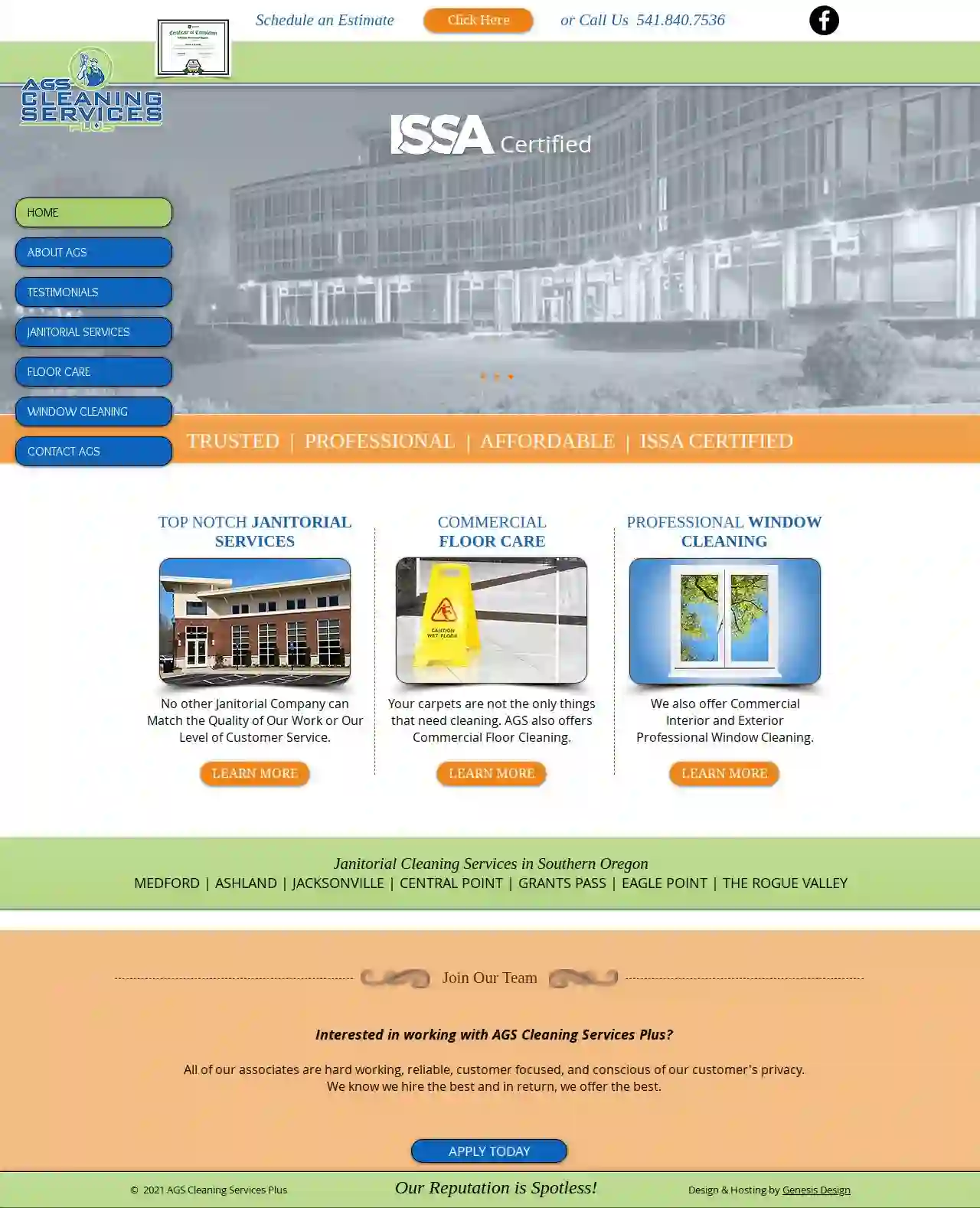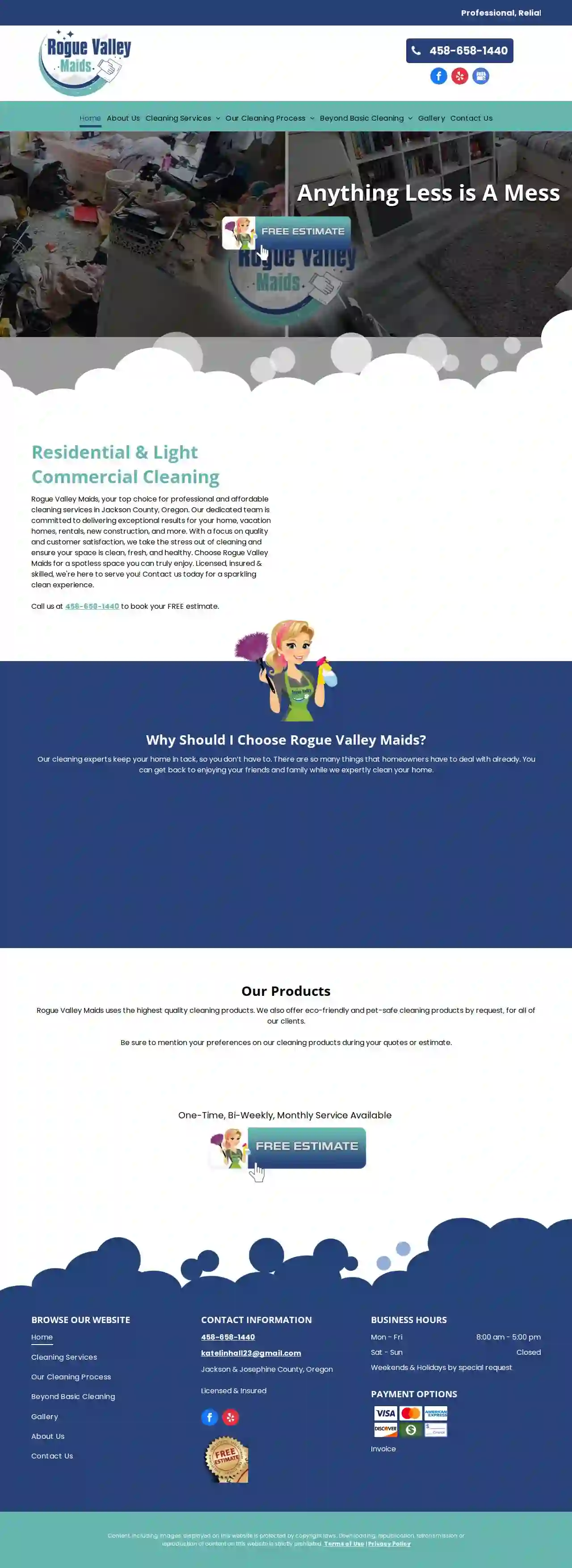Cleaning Services Hudson
Top Housekeeping Services in Hudson
Get 3 FREE Local Cleaners quotes for your project today! Compare profiles, reviews, accreditations, portfolio, etc... and choose the best offer.
Service Needed
City or Town

Clean Hood Services LLC
554 reviewsBoston, US- Services
- Why Us?
- Gallery
Get Quote
Boston Green Commercial Cleaners & JaMa Professional Cleaning
511 reviewsBoston, US- Services
- Why Us?
Get Quote
J & J House Cleaning
3.920 reviewsMedford, US- Services
- Why Us?
Get Quote
AGS Cleaning Services Plus
4.661 reviewsMedford, US- Services
- Why Us?
Get Quote
Auto-Chlor System
533 reviewsMedford, US- Services
- Why Us?
Get Quote
Rogue Valley Maids
510 reviewsMedford, US- Services
- Why Us?
Get Quote
UG2
2.939 reviewsBoston, US- Services
- Why Us?
Get Quote
Maid Sailors Cleaning Service
4.764 reviewsBoston, US- Services
- Why Us?
Get Quote
Boston Cleaning Company, Inc.
4.98 reviewsBoston, US- Services
- Why Us?
Get Quote
As Clean as Can Be Oregon
52 reviewsMedford, US- Services
- Why Us?
Get Quote
Over 60,241+ Cleaning Companies in our network
Our janitorial companies operate in Hudson and surrounding areas!
CleaningMatch has curated and vetted Top Janitorial Businesses in Hudson. Find a top & reliable pro today.
Frequently Asked Questions About Cleaning Services
Find answers to common questions about cleaning services and hiring cleaning companies in the USA.
- Clean Pet Bedding: Wash pet bedding regularly in hot water to remove odors and bacteria.
- Vacuum Thoroughly: Vacuum carpets, rugs, and upholstery frequently using a vacuum cleaner with a pet hair attachment.
- Enzyme Cleaners: Use enzyme cleaners specifically designed for pet odors. These cleaners break down the odor-causing molecules.
- Baking Soda: Sprinkle baking soda on carpets and upholstery, let it sit for a few hours, then vacuum. Baking soda absorbs odors.
- Air Fresheners: Use air fresheners or diffusers to mask odors temporarily.
- Professional Cleaning: For persistent odors, consider hiring a professional cleaning service specializing in pet odor removal.
- Dishes: Load the dishwasher or wash dishes by hand.
- Sink: Clean the sink with a sponge or cloth and dish soap. Pay attention to the faucet and drain. You can also use a baking soda paste to remove stubborn stains.
- Countertops: Wipe down countertops with a disinfectant cleaner or all-purpose cleaner.
- Stovetop: Clean the stovetop with a degreaser or stovetop cleaner. Remove burner grates and wash them separately if needed.
- Oven: Clean the oven according to the manufacturer's instructions. You can use a self-cleaning function or a commercial oven cleaner.
- Microwave: Clean the microwave interior with a damp cloth or sponge. For stuck-on food, heat a bowl of water with lemon juice in the microwave for a few minutes to loosen debris.
- Refrigerator: Wipe down the refrigerator shelves and drawers with a damp cloth or sponge. Remove any expired food and clean spills promptly.
- Floors: Sweep or vacuum the floor, then mop with a floor cleaner suitable for your kitchen floor type.
- Trash: Empty the trash can and recycling bin.
- Experience: 'How long have you been in business, and what type of cleaning services do you specialize in?'
- Licensing and Insurance: 'Are you licensed, insured, and bonded? Can I see proof of coverage?'
- Background Checks: 'Do you conduct background checks on your employees?'
- Cleaning Supplies: 'Do you provide your own cleaning supplies and equipment, or should I provide them?'
- Cleaning Methods: 'What cleaning methods and products do you use?'
- References: 'Can you provide references from previous clients?'
- Scheduling and Availability: 'What days and times are you available for cleaning?'
- Pricing and Payment: 'What is your pricing structure, and what payment methods do you accept?'
- Cancellation Policy: 'What is your cancellation policy?'
- Satisfaction Guarantee: 'Do you offer a satisfaction guarantee? What happens if I'm not happy with the service?'
How do I get rid of pet odors in my home?
Pet odors can linger in a home, creating an unpleasant environment. Here's how to eliminate them:
Regular cleaning, enzyme cleaners, and baking soda are effective methods for eliminating pet odors and maintaining a fresh-smelling home.
Regular cleaning, enzyme cleaners, and baking soda are effective methods for eliminating pet odors and maintaining a fresh-smelling home.
What is the most efficient way to clean a kitchen?
A clean kitchen is essential for food safety and a pleasant cooking experience. Here's an efficient kitchen cleaning process:
Regularly cleaning your kitchen helps maintain a hygienic and organized space for cooking and dining.
Regularly cleaning your kitchen helps maintain a hygienic and organized space for cooking and dining.
Do I need to provide cleaning supplies for the cleaning service?
Most professional cleaning services provide their own cleaning supplies and equipment, including vacuums, mops, cleaning solutions, and microfiber cloths. However, it's always best to confirm this with the company before hiring them.
If you have specific preferences for cleaning products, such as eco-friendly or hypoallergenic options, communicate those to the cleaning service. They may accommodate your requests or allow you to provide your preferred supplies.
If you have specific preferences for cleaning products, such as eco-friendly or hypoallergenic options, communicate those to the cleaning service. They may accommodate your requests or allow you to provide your preferred supplies.
What should I ask a cleaning service before hiring them?
Before hiring a cleaning service, consider asking these questions to ensure they meet your requirements and expectations:
By asking these questions, you can assess their professionalism, reliability, and suitability for your cleaning needs.
By asking these questions, you can assess their professionalism, reliability, and suitability for your cleaning needs.
How do I get rid of pet odors in my home?
Pet odors can linger in a home, creating an unpleasant environment. Here's how to eliminate them:
Regular cleaning, enzyme cleaners, and baking soda are effective methods for eliminating pet odors and maintaining a fresh-smelling home.
- Clean Pet Bedding: Wash pet bedding regularly in hot water to remove odors and bacteria.
- Vacuum Thoroughly: Vacuum carpets, rugs, and upholstery frequently using a vacuum cleaner with a pet hair attachment.
- Enzyme Cleaners: Use enzyme cleaners specifically designed for pet odors. These cleaners break down the odor-causing molecules.
- Baking Soda: Sprinkle baking soda on carpets and upholstery, let it sit for a few hours, then vacuum. Baking soda absorbs odors.
- Air Fresheners: Use air fresheners or diffusers to mask odors temporarily.
- Professional Cleaning: For persistent odors, consider hiring a professional cleaning service specializing in pet odor removal.
Regular cleaning, enzyme cleaners, and baking soda are effective methods for eliminating pet odors and maintaining a fresh-smelling home.
What is the most efficient way to clean a kitchen?
A clean kitchen is essential for food safety and a pleasant cooking experience. Here's an efficient kitchen cleaning process:
Regularly cleaning your kitchen helps maintain a hygienic and organized space for cooking and dining.
- Dishes: Load the dishwasher or wash dishes by hand.
- Sink: Clean the sink with a sponge or cloth and dish soap. Pay attention to the faucet and drain. You can also use a baking soda paste to remove stubborn stains.
- Countertops: Wipe down countertops with a disinfectant cleaner or all-purpose cleaner.
- Stovetop: Clean the stovetop with a degreaser or stovetop cleaner. Remove burner grates and wash them separately if needed.
- Oven: Clean the oven according to the manufacturer's instructions. You can use a self-cleaning function or a commercial oven cleaner.
- Microwave: Clean the microwave interior with a damp cloth or sponge. For stuck-on food, heat a bowl of water with lemon juice in the microwave for a few minutes to loosen debris.
- Refrigerator: Wipe down the refrigerator shelves and drawers with a damp cloth or sponge. Remove any expired food and clean spills promptly.
- Floors: Sweep or vacuum the floor, then mop with a floor cleaner suitable for your kitchen floor type.
- Trash: Empty the trash can and recycling bin.
Regularly cleaning your kitchen helps maintain a hygienic and organized space for cooking and dining.
Do I need to provide cleaning supplies for the cleaning service?
Most professional cleaning services provide their own cleaning supplies and equipment, including vacuums, mops, cleaning solutions, and microfiber cloths. However, it's always best to confirm this with the company before hiring them.
If you have specific preferences for cleaning products, such as eco-friendly or hypoallergenic options, communicate those to the cleaning service. They may accommodate your requests or allow you to provide your preferred supplies.
If you have specific preferences for cleaning products, such as eco-friendly or hypoallergenic options, communicate those to the cleaning service. They may accommodate your requests or allow you to provide your preferred supplies.
What should I ask a cleaning service before hiring them?
Before hiring a cleaning service, consider asking these questions to ensure they meet your requirements and expectations:
By asking these questions, you can assess their professionalism, reliability, and suitability for your cleaning needs.
- Experience: 'How long have you been in business, and what type of cleaning services do you specialize in?'
- Licensing and Insurance: 'Are you licensed, insured, and bonded? Can I see proof of coverage?'
- Background Checks: 'Do you conduct background checks on your employees?'
- Cleaning Supplies: 'Do you provide your own cleaning supplies and equipment, or should I provide them?'
- Cleaning Methods: 'What cleaning methods and products do you use?'
- References: 'Can you provide references from previous clients?'
- Scheduling and Availability: 'What days and times are you available for cleaning?'
- Pricing and Payment: 'What is your pricing structure, and what payment methods do you accept?'
- Cancellation Policy: 'What is your cancellation policy?'
- Satisfaction Guarantee: 'Do you offer a satisfaction guarantee? What happens if I'm not happy with the service?'
By asking these questions, you can assess their professionalism, reliability, and suitability for your cleaning needs.